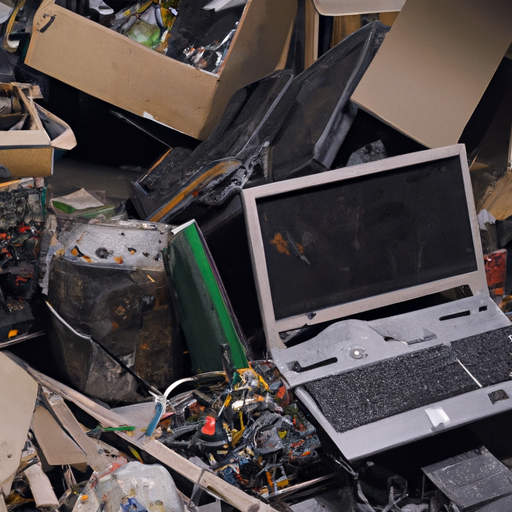“Recycle Responsibly – Protect Our Planet with E-Waste!”
Introduction
Recycling e-waste is an important part of protecting the environment and conserving natural resources. E-waste, or electronic waste, is any discarded electronic device or component that is no longer in use. This includes computers, cell phones, televisions, and other electronic items. Recycling e-waste helps to reduce the amount of hazardous materials that are released into the environment, as well as conserving resources that would otherwise be wasted. In this article, we will discuss the importance of recycling e-waste, as well as how to properly recycle it.
How to Properly Dispose of E-Waste: A Step-by-Step Guide
1. Research local e-waste disposal options. Check with your local government or waste management company to find out what e-waste disposal options are available in your area.
2. Separate your e-waste. Sort your e-waste into categories such as computers, monitors, printers, and other electronic devices.
3. Contact a certified e-waste recycler. Contact a certified e-waste recycler to arrange for the pickup or drop-off of your e-waste.
4. Prepare your e-waste for disposal. Remove all personal data from your e-waste and make sure all components are disconnected and ready for disposal.
5. Dispose of your e-waste. Drop off your e-waste at a certified e-waste recycler or have it picked up by a certified e-waste recycler.
6. Confirm your e-waste has been recycled. Ask the certified e-waste recycler for proof that your e-waste has been recycled in an environmentally responsible manner.
7. Monitor your e-waste disposal. Keep track of the e-waste you have disposed of and make sure it is recycled in an environmentally responsible manner.
The Benefits of Recycling E-Waste: Why It’s Important to Do It Right

Recycling e-waste is an important part of protecting the environment and conserving natural resources. Electronic waste, or e-waste, is any discarded electronic device or component that is no longer in use. This includes computers, televisions, cell phones, and other electronic items. E-waste is a growing problem, as more and more electronic devices are produced and discarded each year.
Recycling e-waste is beneficial for a number of reasons. First, it reduces the amount of waste that is sent to landfills. Electronic waste contains hazardous materials such as lead, mercury, and cadmium, which can leach into the soil and contaminate groundwater. By recycling e-waste, these materials can be safely disposed of and kept out of the environment.
Second, recycling e-waste conserves natural resources. Many of the materials used to make electronic devices, such as copper, gold, and silver, are finite resources. By recycling these materials, we can reduce the need to extract new resources from the earth.
Third, recycling e-waste can help create jobs. Many companies specialize in recycling e-waste, and these companies often employ people to sort, dismantle, and process the materials. This can help create jobs in the local community and provide economic benefits.
Finally, recycling e-waste can help reduce energy consumption. Manufacturing new electronic devices requires a lot of energy, and recycling e-waste can help reduce the need for new production. This can help reduce greenhouse gas emissions and contribute to a healthier environment.
It is important to note, however, that recycling e-waste must be done properly. Improper disposal of e-waste can lead to the release of hazardous materials into the environment, which can be harmful to human health and the environment. It is important to find a reputable recycling company that follows proper safety protocols and is certified by the Environmental Protection Agency (EPA).
In conclusion, recycling e-waste is an important part of protecting the environment and conserving natural resources. It can reduce the amount of waste sent to landfills, conserve natural resources, create jobs, and reduce energy consumption. However, it is important to ensure that e-waste is recycled properly in order to avoid the release of hazardous materials into the environment.
How to Find a Responsible E-Waste Recycling Facility Near You
Responsible e-waste recycling is an important part of protecting the environment and preserving natural resources. To ensure that your e-waste is recycled responsibly, it is important to find a reliable and responsible e-waste recycling facility near you. Here are some tips to help you find a responsible e-waste recycling facility:
1. Research local e-waste recycling facilities: Start by researching local e-waste recycling facilities in your area. Look for facilities that are certified by the Basel Action Network (BAN) or the e-Stewards Initiative. These organizations certify e-waste recyclers who adhere to the highest standards of responsible e-waste recycling.
2. Ask questions: Once you have identified a few potential e-waste recycling facilities, contact them and ask questions about their recycling process. Find out what types of e-waste they accept, how they handle hazardous materials, and what measures they take to ensure that e-waste is recycled responsibly.
3. Check reviews: Check online reviews to get an idea of the quality of service provided by the e-waste recycling facility. Look for reviews from customers who have used the facility and ask them about their experience.
4. Visit the facility: If possible, visit the facility in person to get a better understanding of their operations. Ask to see their recycling process and make sure that they are following all safety protocols.
By following these tips, you can find a responsible e-waste recycling facility near you. Doing so will help ensure that your e-waste is recycled responsibly and help protect the environment.
Conclusion
Recycling e-waste is an important step in protecting our environment and reducing the amount of waste that ends up in landfills. By following the steps outlined in this article, you can help to reduce the amount of e-waste that is produced and ensure that it is recycled properly. By taking the time to properly recycle e-waste, you can help to protect our planet and ensure that our future generations have a healthy and sustainable environment to live in.
